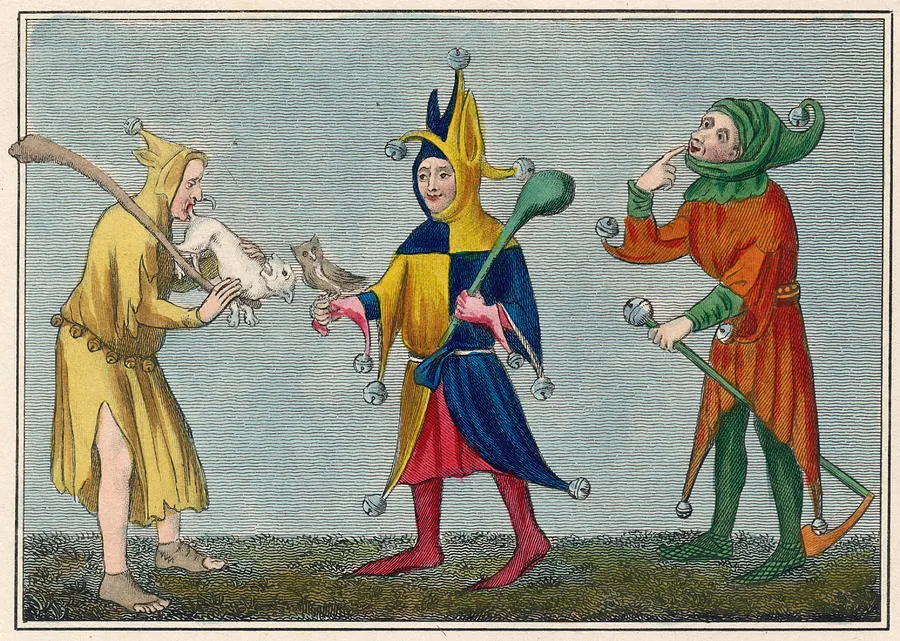Table of Contents
In George R. R. Martin’s A Song of Ice and Fire books (better known as the bowdlerised Game of Thrones tv series), jesters often play important, if minor, roles. Some, like Patchface, serve as one-man Greek choruses; others act almost as clandestine agents. The knight-made-fool, Ser Dontos, tells Sansa Stark, “I hear all sorts of things as a fool that I never heard when I was a knight. They talk as though I am not there.” In a turn left out of the tv series, Tyrion Lannister the dwarf noble is briefly enslaved as a fool. But, even before that, Lannister is noted for his often cutting wit.
Martin famously mines European history for his stories, from the personalities Julio-Claudian dynasty to the War of the Roses. But many minor incidents and characters are also mined from history, especially the European tradition of court jesters.
Court jesters entertained royals and their guests in various ways. From slapstick humor to philosophical conversations, these fools were multi-talented — and they were often rewarded handsomely for their dedicated service.
But of all the jesters throughout history, there are a few whose comedic exploits were so renowned that their names have gone down in the annals of comedy.
Humans have been making fart jokes for almost as long as they’ve been drawing dicks. The oldest recorded joke is a Sumerian tablet relating a fart joke. So, it’s no surprise that a literal fart-artist became a celebrated jester.
Little is known about Roulandus le Fartere — also known as Roland the Farter — other than that he was certainly a real person, most likely worked as a jester for King Henry II of England, and received a hefty payment for his comedic services […]
It was during the winter holidays each year that Roland would perform his most famous feat: “unum saltum et siffletum et unum bumbulum” — a jump, a whistle, and a fart. The king and his honored guests must have found the jester’s routine so humorous that Henry rewarded Roland with a manor and 30 acres in Suffolk in 1159.
If farters were so valued these days, some of my old mates from school would be billionaires.
In Martin’s books, dwarfs are commonly employed as jesters, just as they were in historical reality. As they also do at times, in A Song of Ice and Fire, they could sometimes push the boundaries of what even a jester could get away with.
Triboulet worked primarily for King Francis I of France during the early 16th century, and he sought to find humor in almost any situation. As a result, he had a tendency to take his jokes too far […]
Triboulet’s sharp wit, however, nearly cost him his head when he slapped the king on his backside in front of a room full of courtiers. Francis offered him an out, however, if he could come up with an apology more offensive than the spanking.
“I’m so sorry, Your Majesty, that I didn’t recognize you!” Triboulet reportedly said. “I mistook you for the Queen!”
And on yet another occasion, after Triboulet had once again offended the king, Francis decided to mercifully allow the jester to choose the manner of his death. “Good sire,” Triboulet responded, “I choose to die from old age.”
Fans of A Game of Thrones will surely recognise that joke, with some extra ribald twists, as used by Tyrion Lannister. Like Tyrion, as well, some jesters were famous for their love of alcohol.
Perkeo of Heidelberg was born Clemens Pankert in 1702, and like many other jesters of the age, he was a dwarf. Fortunately for Perkeo, his short stature and sharp personality enabled him to fall into the good graces of Prince Charles III Philip of the Holy Roman Empire. Perkeo was brought to Heidelberg Castle as a teenager to work as the prince’s jester and cup-bearer.
It was in Heidelberg that Perkeo earned his moniker. According to the official website of Heidelberg Castle, Perkeo was rather fond of wine. Any time someone asked if he’d like another glass, he would respond in Italian, “Perché no?” which translates to: “Why not?”
Historical accounts claim that Perkeo drank anywhere between five and eight gallons of wine each day […] One popular legend says that Perkeo wound up living well into his 80s only ever having drunk wine until one day he fell ill. The story goes that a doctor instructed Perkeo to drink some water — and he died the next day.
All That’s Interesting
There’s a lesson in that, perhaps.









